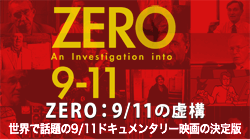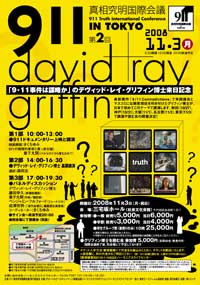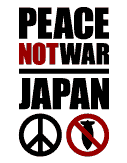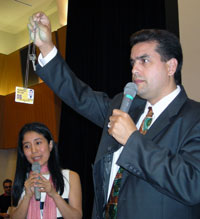Wednesday, April 25, 2012
Japan's Nuclear Power Plants Count Down to ZERO
Starting tomorrow, April 26, 2012, Japan's last remaining nuclear power plant will have only 10 days left before it is shut down. Some people are happily counting down from ten to zero from tomorrow. The last plant is the Tomari #3 nuclear reactor owned by Hokkaido Electric Company and it is going to be shut down on May 5, 2012 for its regular check up.
The Japanese government is trying to reopen Oi #3 and #4 nuclear reactors in Fukui before the total shut down of all 54 nuclear reactors, but citizens together with some 50 politicians are against the reopening of Oi, which could mean the total shut down of all the 54 nuclear reactors for the first time since nuclear power plants started operating in Japan in 1966.
Here is a list of all the nuclear power plants in Japan and their shut-down dates:
http://www.jca.apc.org/mihama/fukushima/genpatsu_jyoukyou_20120326.pdf
There are ten electric companies in Japan and each company is a regional monopolistic enterprise and consumers have no choice but to buy electricity from one company.
As of today, only onw nuclear reactor (Tomari #3) is in operation. The other 53 reactors are shut down due to check ups or trouble. This fact (only one reactor in operation) seem surprising to many nationally and internationally as we were told that 30% of Japan's energy comes from nuclear power.
In reality, no nuclear power plants have been in operation in Honshu, Shikoku and Kyushu for some time, yet there has been no energy shortage.
The Japanese government is working hard to reopen the Oi nuclear power plant as they are afraid of a total shut down of nuclear power in Japan. The fact Japan can do without nuclear power plants is frightening to them as they had kept on telling the Japanese people that Japan could not live without nuclear power.
They do not want Japanese people to know Japan has enough power without nuclear power plants.
There have been many people in Japan who have said that Japan's energy needs could be met without nuclear power. Scholars and journalists including Yuko Fujita, Takashi Hirose, Yu Tanaka, Atsushi Tsuchida, Hiroaki Koide are some...
So, May 5, 2012, the Japanese people will finally realize the fact that they CAN do without nuclear power.
If what the government and electric companies have been saying had been true, we would have experienced power shortages and black outs by now. But so far, none!! This fact that we can do without nuclear power is surprising to many. People have tended to believe the government story that Japan can not live without nuclear power.
We were deceived. They were lying.
Because of the March 11the tsunami, earthquake and resulting radiation release, the Japanese people are finally demanding the total shut down of nuclear power to the government and electric companies.
Below is the list of shut down dates of nuclear power plants of the nine electric corporations:
Tohoku Electric Co.: No nuclear power since March 11, 2011.
Tokyo Electric Co.: No nuclear power since March 26, 2012
Chubu Electric Co.: No nuclear power since May 14, 2011
Hokuriku Electric Co.: No nuclear power since March 11, 2011
Kansai Electric Co.: No nuclear power since Feb 20, 2012
Chugoku Electric Co.: No nuclear power since Jan 27, 2012
Shikoku Electric Co.: No nuclear power since Jan 13, 2012
Kyusyu Electric Co.: No nuclear power since Dec 1, 2011
Hokkaido Electric Co.: Last one to be shut on May 5, 2012
Okinawa Electric Co.: has no nuclear power at all.
(There may be depleted uranium munitions and even nuclear bombs stored in US bases in Okinawa.)
Japan may become the first country to have a post-nuclear power society in spite of all the effort its government and electric companies are making to reopening the nuclear power plants.
10 days count down to "ZERO nuclear power" in Japan! This is the best news since March 11, 2011.
Japan should be the leader of renewable and sustainable energy society so that other countries can follow.
The operation of nuclear power plants on earthquake faults is a threat to the health of young people in the world and to environment as if there is a release of radiation after an accident it will spread and go around the world just like radiation from Fukushima Daiichi nuclear power plant is now spreading through the air and water. The Japanese people are finally demanding from their government that there be a total shut down of nuclear power plants and a shift to renewable energy.
The Japanese government is trying to reopen Oi #3 and #4 nuclear reactors in Fukui before the total shut down of all 54 nuclear reactors, but citizens together with some 50 politicians are against the reopening of Oi, which could mean the total shut down of all the 54 nuclear reactors for the first time since nuclear power plants started operating in Japan in 1966.
Here is a list of all the nuclear power plants in Japan and their shut-down dates:
http://www.jca.apc.org/mihama/fukushima/genpatsu_jyoukyou_20120326.pdf
There are ten electric companies in Japan and each company is a regional monopolistic enterprise and consumers have no choice but to buy electricity from one company.
As of today, only onw nuclear reactor (Tomari #3) is in operation. The other 53 reactors are shut down due to check ups or trouble. This fact (only one reactor in operation) seem surprising to many nationally and internationally as we were told that 30% of Japan's energy comes from nuclear power.
In reality, no nuclear power plants have been in operation in Honshu, Shikoku and Kyushu for some time, yet there has been no energy shortage.
The Japanese government is working hard to reopen the Oi nuclear power plant as they are afraid of a total shut down of nuclear power in Japan. The fact Japan can do without nuclear power plants is frightening to them as they had kept on telling the Japanese people that Japan could not live without nuclear power.
They do not want Japanese people to know Japan has enough power without nuclear power plants.
There have been many people in Japan who have said that Japan's energy needs could be met without nuclear power. Scholars and journalists including Yuko Fujita, Takashi Hirose, Yu Tanaka, Atsushi Tsuchida, Hiroaki Koide are some...
So, May 5, 2012, the Japanese people will finally realize the fact that they CAN do without nuclear power.
If what the government and electric companies have been saying had been true, we would have experienced power shortages and black outs by now. But so far, none!! This fact that we can do without nuclear power is surprising to many. People have tended to believe the government story that Japan can not live without nuclear power.
We were deceived. They were lying.
Because of the March 11the tsunami, earthquake and resulting radiation release, the Japanese people are finally demanding the total shut down of nuclear power to the government and electric companies.
Below is the list of shut down dates of nuclear power plants of the nine electric corporations:
Tohoku Electric Co.: No nuclear power since March 11, 2011.
Tokyo Electric Co.: No nuclear power since March 26, 2012
Chubu Electric Co.: No nuclear power since May 14, 2011
Hokuriku Electric Co.: No nuclear power since March 11, 2011
Kansai Electric Co.: No nuclear power since Feb 20, 2012
Chugoku Electric Co.: No nuclear power since Jan 27, 2012
Shikoku Electric Co.: No nuclear power since Jan 13, 2012
Kyusyu Electric Co.: No nuclear power since Dec 1, 2011
Hokkaido Electric Co.: Last one to be shut on May 5, 2012
Okinawa Electric Co.: has no nuclear power at all.
(There may be depleted uranium munitions and even nuclear bombs stored in US bases in Okinawa.)
Japan may become the first country to have a post-nuclear power society in spite of all the effort its government and electric companies are making to reopening the nuclear power plants.
10 days count down to "ZERO nuclear power" in Japan! This is the best news since March 11, 2011.
Japan should be the leader of renewable and sustainable energy society so that other countries can follow.
The operation of nuclear power plants on earthquake faults is a threat to the health of young people in the world and to environment as if there is a release of radiation after an accident it will spread and go around the world just like radiation from Fukushima Daiichi nuclear power plant is now spreading through the air and water. The Japanese people are finally demanding from their government that there be a total shut down of nuclear power plants and a shift to renewable energy.
Saturday, April 21, 2012
Radiation and Health Talk @Island Naturals, Kona, Hawaii 1pm
It is quite short notice, but tomorrow April 21, 2012, I am speaking at Island Naturals (Kona) @1pm and you are very welcome to be there.
If you have small children and/or are concerned about low level radiation exposure due to current Fukushima Daiichi Nuclear Power plant disaster and its radiation leak (contaminated water will be in the Hawaii area any time now), please join us tomorrow at Island Naturals in town at 1pm. I will talk about:
1. Current situation of Fukushima Daiichi Nuclear Power plants and its effect on the environment, especially in relation to Hawaii
2. What you can do now to reduce the negative effects of exposure to radiation
A personal health consultation by Gen and Yumi Morita (Harmonics Healing Practitioners) can taken after the talk if anyone is interested (with fee).
----------
Yumi's profile: Born and raised in Tokyo. After working as a reporter and a bond trader, from 1990 she chose to work at solving environmental problems and made this the focus of her life work. She has launched several movements and NGOs such as Monkey Bay Wildlife Sanctuary (in Belize), Clean Up Campaign (JEAN, Japan), Niji no Hebi (Rainbow Serpent, Plutonium Free Future, Japan & USA), SAFE(Safe Alternative on Food and Environment, Hong Kong), Harmonics Life Center(Kamogawa, Japan), Global Peace Campaign (International), Tokyo Peace Film Festival(Tokyo, Japan), JUMP (Japan United for Ministry of Peace, Japan) and recently Tsunagu Hikari-Connecting Light (A relief project for pregnant women and children from Fukushima, Japan and USA). In 1988 after she moved to Kamogawa in the countryside of Chiba she started practicing a sustainable lifestyle with her partner Gen. They grew most of what they ate as well as their children organically. After 311, they decided to create a Harmonics Life Center in Kailua Kona, Hawaii. Their concept was to promote a functional sustainable lifestyle within the confines of the American consumer society. This had been their dream since 2001. Harmonics Healing Hawaii opened in April 2012. Yumi has been an advocate of natural medicine and sustainable living. She has given lectures nationally and internationally on radiation and health.
Subscribe to:
Comments (Atom)


















